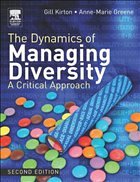Main description:
This text takes the view that the study of equality needs to consider not only issues of discrimination, but also the needs of people in relation to their diverse cultures and identities. It therefore takes a different approach to the issues of quality and diversity in the world of employment. The Dynamics of Managing Diversity discusses diversity as recognition of the differences and similarities between and among social groups, and how resulting policies must reflect these.
This new edition has been extensively revised and up-dated to incorporate new conceptual, theoretical and empirical work now available in this growing subject area.
- More up-to-date examples incorporated throughout this new edition
- Up-to-date statistical data presented to make the text current with insights from the most recent contributions to the literature
- Draws on new research available on European approaches to diversity
Review quote:
'This text redresses the balance in a field that is often overly prescriptive, by presenting balanced, well-argued, and clearly set-out critiques, clarifying key terminology for students who may not be familiar with the range presented here.'
Sue Ledwith, Lecturer in HRM, Oxford Brookes University
The Dynamics of Managing Diversity provides that ranging across gender, sexual orientation, age, disability and race, the text seeks to provide a well balanced, well argued and clearly set out critique of current thinking and knowledge in this field. This is an excellent book and for those wishing to look at these emotive issues within an employment context, this is a good place to go.
Public Admin Research Centre, The Journal of the Institute of Public Sector Management.
Table of contents:
Context and concepts - Mapping the equality and diversity territory; The social and economic landscape; Theorizing labour market segmentation and identity issues; Diversity, equality and discrimination in organizations; Theorizing equality and diversity approaches; Policy and practice - Legislative framework; Trade unions as agents of change; Organizational policy and practice; Human resource management and the equality project; State policy, social provision and attitudes: comparison with and between member states of the European union.
This text takes the view that the study of equality needs to consider not only issues of discrimination, but also the needs of people in relation to their diverse cultures and identities. It therefore takes a different approach to the issues of quality and diversity in the world of employment. The Dynamics of Managing Diversity discusses diversity as recognition of the differences and similarities between and among social groups, and how resulting policies must reflect these.
This new edition has been extensively revised and up-dated to incorporate new conceptual, theoretical and empirical work now available in this growing subject area.
- More up-to-date examples incorporated throughout this new edition
- Up-to-date statistical data presented to make the text current with insights from the most recent contributions to the literature
- Draws on new research available on European approaches to diversity
Review quote:
'This text redresses the balance in a field that is often overly prescriptive, by presenting balanced, well-argued, and clearly set-out critiques, clarifying key terminology for students who may not be familiar with the range presented here.'
Sue Ledwith, Lecturer in HRM, Oxford Brookes University
The Dynamics of Managing Diversity provides that ranging across gender, sexual orientation, age, disability and race, the text seeks to provide a well balanced, well argued and clearly set out critique of current thinking and knowledge in this field. This is an excellent book and for those wishing to look at these emotive issues within an employment context, this is a good place to go.
Public Admin Research Centre, The Journal of the Institute of Public Sector Management.
Table of contents:
Context and concepts - Mapping the equality and diversity territory; The social and economic landscape; Theorizing labour market segmentation and identity issues; Diversity, equality and discrimination in organizations; Theorizing equality and diversity approaches; Policy and practice - Legislative framework; Trade unions as agents of change; Organizational policy and practice; Human resource management and the equality project; State policy, social provision and attitudes: comparison with and between member states of the European union.

